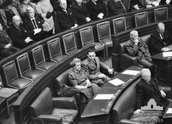
Senator Dorothy Tangney: Maiden Speech (1944)
Synopsis
Dorothy Tangney, Australia’s first woman senator, delivered her maiden speech in the Senate in Canberra on 24 September 1943, at the age of 32. This recording of Tangney reading her maiden speech was made by the ABC in Sydney on 21 April 1944.
Early in the speech, which differs only slightly to the original Hansard transcript, the Labor senator for Western Australia acknowledges her unique experience in being the first female senator. She pays tribute to the contribution of allies and various sectors of Australian society to the war effort, but primarily the focus of her speech is looking towards the future: a postwar society in which the Labor government plans to introduce various welfare measures and reconstruct Australia.
Curator’s notes
Australia was the first country to give most women the right to vote and to stand for election. Marisa Ruedas argues that it wasn’t until attitudes to the place of women in society changed during the Second World War that women succeeded in being elected to the federal government ('Women in the Senate’, Senate Brief No. 3, September 1999).
Tangney had unsuccessfully stood for election on several occasions before 1943. Her interest in politics, believed to be the influence of her unionist father, began early. Tangney started a Labor club at the University of Western Australia and also founded the Young Labor League in Fremantle. Born in Perth, Tangney was educated at St Joseph’s Convent, Fremantle. At university she studied to be a schoolteacher and was president of the debating society.
Although this recording is not the original delivery of her speech, it demonstrates the senator’s experience as a public speaker, which derived from her political activities. Newspaper reports of the time comment on her confidence as a speaker and that she didn’t refer to notes during the delivery of the speech. Were these patronising comments? Was there a certain anxiety about hearing a female voice in parliament? Were some commentators surprised that this event went smoothly?
Her desire to commit to her new position as senator was demonstrated by speaking unexpectedly the day before her maiden speech. Soon after Tangney took the oath of allegiance on 23 September 1943, she made her first remarks by speaking to the motion of condolence for the late Senator Cunningham. On 26 September, two days after her speech, Senator Tangney was also the subject of the ‘Guest of Honour’ Sunday evening slot on national radio.
Though Australia was still at war, the nation was beginning to plan for a postwar society. Newspapers reported that the 17th Parliament opened in a spirit of optimism, as there was a feeling that the conflicts were coming to a close. Senator Tangney’s speech begins with a statement recognising the honour of being the first woman elected to the Upper House but she points out that she has been elected as a citizen of the Commonwealth, not as a woman. This statement echoes the aspirations of the suffrage movement. Tangney moves swiftly on to the business of politics, however throughout the speech she does give due attention to the participation of women in public life. For example, she refers to the contribution of women to the war effort, in areas such as munitions manufacture.
The bulk of the speech is about the future. The plan that the federal government has for a postwar Australia includes various welfare measures, the federal control of education and measures to assist the rehabilitation of returned servicemen and women. Some of these issues became the main preoccupations of Tangney’s political career as a senator, which lasted until she retired in 1968. Camille Tangney, the daughter of Dorothy’s first cousin Melville James Tangney, recalls her visits to Dorothy’s busy home in Claremont, Perth. Camille remembers 'Aunty Dorothy’ as always there for those less fortunate than herself, and a politician who was ahead of her time.
In 1968 Tangney was appointed a Dame Commander of the Order of the British Empire for her services to the Australian Parliament. In 1974 the federal electoral division of Tangney in Western Australia was named in her honour. DorothyTangney died in 1985. In 1993 she and Dame Enid Lyons appeared on a 45 cent stamp and in 1999 a street near Old Parliament House was renamed Dorothy Tangney Place (see also Dame Enid Lyons: Maiden Speech, 1943).
Senator Tangney delivered her speech on 24 September 1943 in the Senate of the then Parliament House in Canberra. This building is now called ‘Old Parliament House’ and houses the Museum of Australian Democracy. Australian parliamentary broadcasts did not begin until July 1946 after an allocation of ₤10,000 to equip the Senate and the House of Representatives with technical equipment and facilities.
This recording on one side only over two 16” discs is dated 21 April 1944, with the recording location listed as Sydney. Other recordings of wartime broadcasts have survived in the NFSA, including speeches by John Curtin (see Curtin Speech: Japan Enters Second World War, 1941) and two other wartime prime ministers, Robert Menzies (see Menzies Speech: Declaration of War, 1939) and Ben Chifley, as well as news reports and light entertainment such as variety shows and serials.
- Overview
- Curator’s notes
- Audio full title
- Find a copy
- Make a comment
- Map
- Extras
- Add your review



